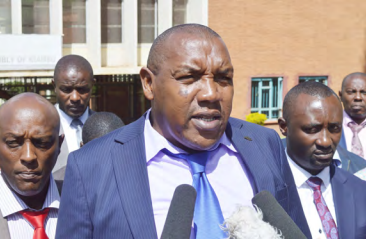
Elected Kiambu MCAs have clarified that a motion tabled to change the system of voting is not targeting their nominated counterparts.
Riabai MCA Hezron Njoroge gave notice to table the motion seeking to have MCAs vote through a delegation system on November 11.
The system is used in the Senate when senators are voting on matters touching on counties and sees each county delegation cast one vote through the head of the delegation.
But a court order stopped the tabling of the motion as some MCAs claimed it was a ploy to lock out nominated MCAs, who are mostly women, from voting.
Njoroge, however, said the issue has been blown out of proportion noting that the main aim is not to prohibit nominated leaders from voting, as leaders from a certain area will be consulting before casting their one vote.
He said the aim of the motion is to enforce equal voting rights for members from all subcounties since some subcounties are overrepresented.
“Some subcounties such as Kiambu and Lari are disadvantaged when it comes to representation since they don’t have nominated MCAs yet Thika subcounty that has five wards has seven nominated members,” Njoroge said.
He said all counties have the discretion of amending their standing orders for inclusivity and equality.
The motion was stopped after nominated MCAs Rahab Mwaura, Alice Kamau and Tabitha Wangui filed a petition at the High Court in Kiambu.
Justice Abigail Mshila gave conservatory orders suspending the debating and passing of the motion to amend the standing orders.
The court scheduled the matter for a mention on February 13 next year.
The elected members urged the Judicial Service Commission to investigate the conduct of the High Court in Kiambu, saying it is interfering with county assembly’s legislative role yet it is an independent institution.
“We have received eight court orders barring the assembly from legislating on matters that the executive finds unfavourable,” Limuru East MCA Macharia Wambui said.
His Ngoliba counterpart Joachim Njama said elected MCAs are not fighting the governor but want accountability for funds meant for development.
“We are not prohibiting any nominated MCA from voting, we are simply saying that as Thika subcounty leaders, we should have a common vote and not disadvantage other subcounties which do not have many nominated members,” he said.
Njama said the courts should not be used to interfere with the operations of the assembly that he said enjoys autonomy.
The members accused the executive of allegedly using nominated MCAs to pass bills in its favour.
“They used nominated MCAs to pass a bill where level two and three hospitals charge residents for services and medication but we had earlier passed a bill exempting residents from paying,” they said.
They said some nominated members of the assembly were sourced from other counties and do not have residents’ interests at heart.
The assembly has 60 elected and 25 nominated members.
In the current assembly standing orders, all
members are eligible to vote and a
simple majority of 28 members can
pass bills and motions.
















